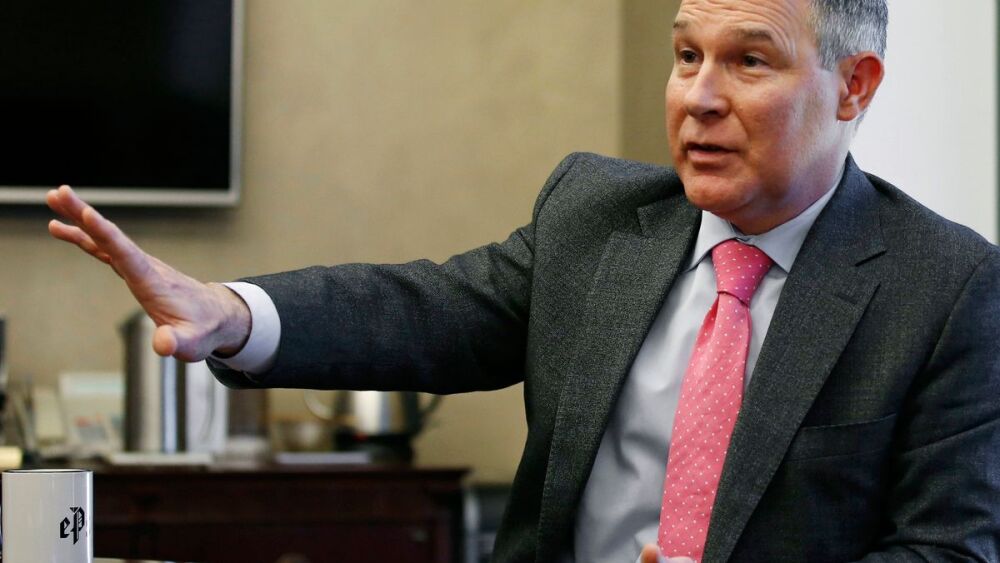President-elect Donald Trump announced his choice of U.S. Environmental Protection Agency (EPA) administrator in Oklahoma Attorney General Scott Pruitt. And then, a frenzy ensued.
Green organizations like Sierra Club and Environmental Defense Fund mobilized their rhetoric, citing his history of EPA lawsuits. Others like Governor Christine Todd Whitman, EPA administrator under President George W. Bush, are also against the choice. But Pruitt has support, and not just from fossil fuel industries, but those with anti-federalist points-of-view and moderates that think the EPA is just a little too big for its britches.
Despite the controversy over Pruitt, the battle over fossil fuel development may not be fought at a national policy level, but on the front lines of affected communities.
Power Fights with EPA
Pruitt has formerly participated in eight federal lawsuits against the agency, according to Tulsa World. As a figure, he questions EPA’s authority to regulate states and businesses. Most recently in August, Oklahoma along with other states filed a lawsuit against methane emissions requirements for new oil and natural gas equipment. The rules target 2025 emissions reductions generated by the oil and gas industry.
Along with 26 other states, Pruitt challenged the new Clean Power Plan, which targets state carbon emissions cuts of 30 percent by 2030. The October 2015 case is pending in the U.S. Court of Appeals for the District of Columbia Circuit. Just a few months before, he filed suits about the agency’s unlawful pollution control measures, including a suit against the Clean Water Act (CWA). The courts dismissed these actions, but an appeal to reopen the argument against CWA is pending.
In 2014, Pruitt joined other states to overturn a 2011 settlement that required EPA to begin regulating greenhouse gases.
In 2011, he filed against the cross-state air pollution rule, but the U.S. Supreme Court upheld the law in 2014. It takes effect in May 2017. That year, he also challenged the EPA’s plan to reduce haze by targeting coal-fired fired power plants operated by Oklahoma Gas and Electric Co. at Red Rock and Muskogee and another operated by American Electric Power-Public Service Company of Oklahoma at Oologah.
The Shadow of Sue and Settle
In addition to being criticized for taking actions to reduce environmental restrictions on the oil and gas industry and coal-fired power generation plants -- something Pruitt defends because restrictions impede economic development -- he has also accused the EPA of colluding with nonprofit and environmental organizations.
In 2013, Pruitt claimed that EPA encourages lawsuits by environmental groups like Greenpeace and the Sierra Club, and then settles the suits by entering consent decrees that contain obligations not found in federal law. A district judge dismissed that lawsuit, siding with the EPA that the records request was overly broad and vague. But, the Federal Committee on Oversight and Government Reform held a hearing on the tactic of “sue and settle” in 2012, and the EPA did not participate.
Some feel Pruitt is a good choice to lead the nation’s top environmental regulatory body. Proponents argue the EPA exceeds its authority and is biased by a renewable energy agenda in its rule making, and that Pruitt will hasten a more neutral relationship between federal regulations and states.
“Pruitt’s background in constitutional law combined with a nuanced understanding of how environmental regulations affect the economy mean that he will be a thoughtful leader of the EPA and one capable of striking the balance between protecting the environment and our economy,” wrote Mike Turpen, a lawyer and Oklahoma democrat, in Tulsa World.
Green Fights to Ensue
The nation’s largest environmental organization, the Sierra Club, is asking the Senate to oppose the nomination:
“Having Scott Pruitt in charge of the U.S. Environmental Protection Agency is like putting an arsonist in charge of fighting fires. He is a climate science denier who, as Attorney General for the state of Oklahoma, regularly conspired with the fossil fuel industry to attack EPA protections,” said Michael Brune, executive director, in a Sierra Club statement.
Most groups rail against Pruitt for the role calling him a climate change dissenter, climate change denialist, etc. The opinions of environmental groups are summarized efficiently by Fred Krupp, president of the Environmental Defense Fund, in a recent opinion piece:
“Pruitt has a record of opposing many of the clean air, clean water and environmental health protections that Americans overwhelmingly support....Pruitt characterizes these legal challenges as a righteous assault on overweening federal power. But their real impact would have been simply to allow the powerful to pollute without legal consequence, Krupp wrote in the New York Daily News.
Water expert Dr. Peter Gleick, co-founder, president emeritus and chief scientist of the Pacific Institute for Studies in Oakland, Calif., tweeted his opinion:
Tomorrow’s @nytimes correction page:
“Dear readers, we misspelled ‘disaster’ as ‘dissenter.’ Our apologies for the confusion. #climatepic.twitter.com/pjND6vr4HN
— Peter Gleick (@PeterGleick) December 8, 2016
Circle of Blue, an important water reporting nexus which Gleick sits on the advisory board of, took a different approach to the Pruitt news. He’ll encounter the ‘red state revolt’ to block fossil fuel development, suggesting bipartisan green fights in fossil fuel hot spots, according to their research.
Author Keith Schneider cited a Kentucky example where Houston-based Kinder Morgan wanted to repurpose an old north-south natural gas pipeline by switching fuel types and reversing the direction of flow. Bipartisan leadership blocked the $412 million, 964-mile-long project due to water supply and explosion risks, according to the report.
“The various struggles to block energy development — and there are dozens across the country — encompass tens of thousands of residents and many elected local and state officials who supported the president-elect. In many cases the protests are assisted by state, regional and national environmental advocacy organizations. Driven by convictions about water quality, public safety and property rights, the rural opponents to big fossil energy installations are slowing development and are likely to defy any effort to quell them by the Trump administration,” Schneider wrote.



